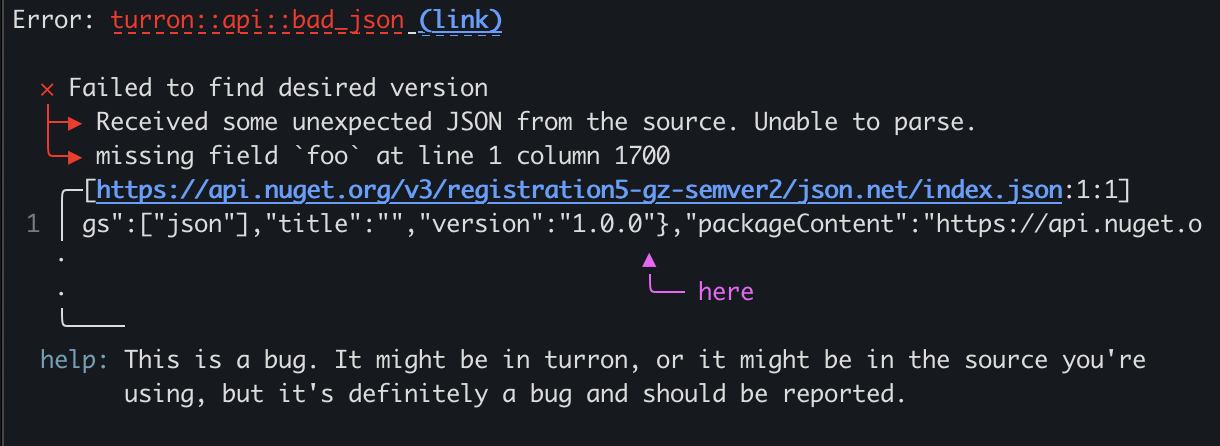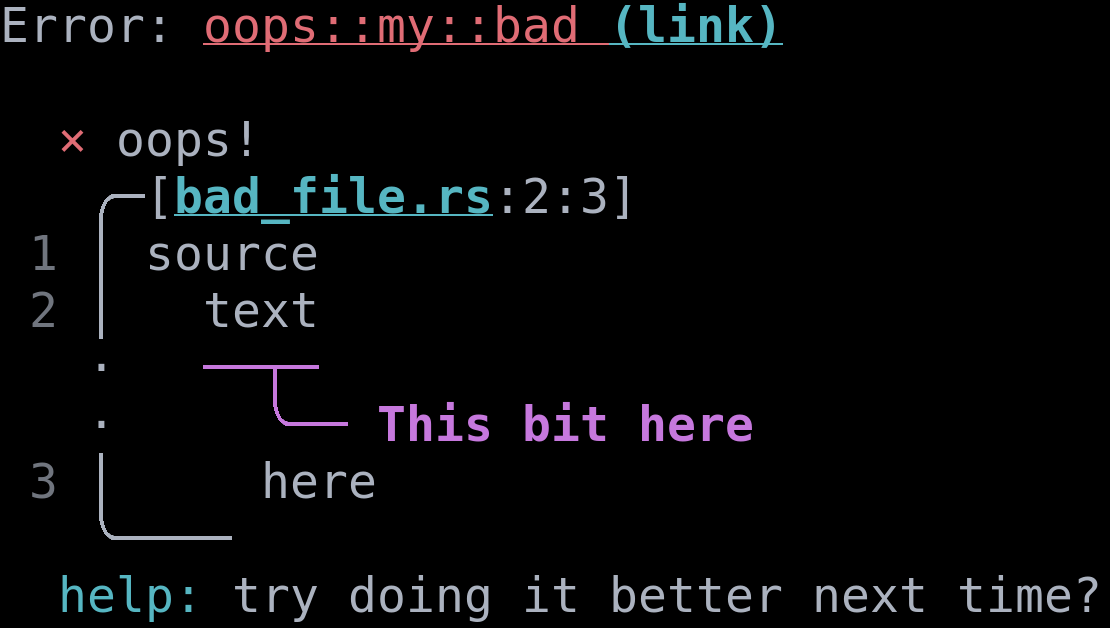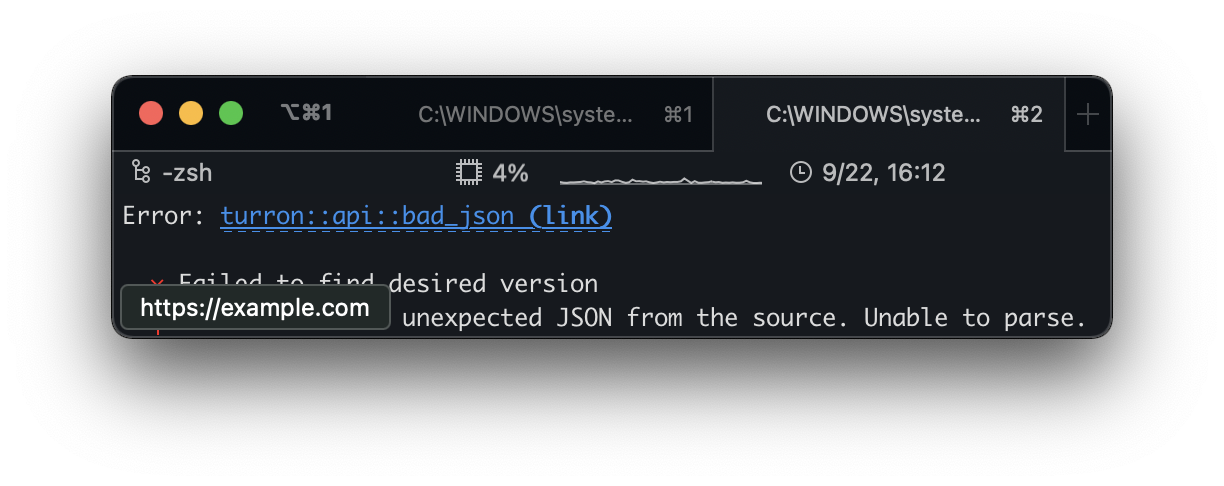you run miette? You run her code like the software? Oh. Oh! Error code for coder! Error code for One Thousand Lines!
About
miette is a diagnostic library for Rust. It includes a series of traits/protocols that allow you to hook into its error reporting facilities, and even write your own error reports! It lets you define error types that can print out like this (or in any format you like!):
Table of Contents
Features
- Generic [Diagnostic] protocol, compatible (and dependent on)
std::error::Error. - Unique error codes on every [Diagnostic].
- Custom links to get more details on error codes.
- Super handy derive macro for defining diagnostic metadata.
anyhow/eyre-compatible error wrapper type, [Report], which can be returned frommain.- Generic support for arbitrary [Source]s for snippet data, with default support for
Strings included.
The miette crate also comes bundled with a default [ReportHandler] with the following features:
- Fancy graphical diagnostic output, using ANSI/Unicode text
- single- and multi-line highlighting support
- Screen reader/braille support, gated on
NO_COLOR, and other heuristics. - Fully customizable graphical theming (or overriding the printers entirely).
- Cause chain printing
- Turns diagnostic codes into links in supported terminals.
Installing
Using cargo-edit:
$ cargo add miette
Example
/*
You can derive a Diagnostic from any `std::error::Error` type.
`thiserror` is a great way to define them, and plays nicely with `miette`!
*/
use miette::{Diagnostic, SourceSpan};
use thiserror::Error;
#[derive(Error, Debug, Diagnostic)]
#[error("oops!")]
#[diagnostic(
code(oops::my::bad),
help("try doing it better next time?"),
)]
struct MyBad {
// The Source that we're gonna be printing snippets out of.
// This can be a String if you don't have or care about file names.
src: NamedSource,
// Snippets and highlights can be included in the diagnostic!
#[snippet(src, message("This is the part that broke"))]
snip: SourceSpan,
#[highlight(snip, label("This bit here"))]
bad_bit: SourceSpan,
}
/*
Now let's define a function!
Use this Result type (or its expanded version) as the return type
throughout your app (but NOT your libraries! Those should always return concrete
types!).
*/
use miette::{Result, NamedSource};
fn this_fails() -> Result<()> {
// You can use plain strings as a `Source`, or anything that implements
// the one-method `Source` trait.
let src = "source\n text\n here".to_string();
let len = src.len();
Err(MyBad {
src: NamedSource::new("bad_file.rs", src),
snip: (0, len).into(),
bad_bit: (9, 4).into(),
})?;
Ok(())
}
/*
Now to get everything printed nicely, just return a Result<()>
and you're all set!
Note: You can swap out the default reporter for a custom one using `miette::set_reporter()`
*/
fn pretend_this_is_main() -> Result<()> {
// kaboom~
this_fails()?;
Ok(())
}
And this is the output you'll get if you run this program:
Using
... in libraries
miette is fully compatible with library usage. Consumers who don't know about, or don't want, miette features can safely use its error types as regular [std::error::Error].
We highly recommend using something like thiserror to define unique error types and error wrappers for your library.
While miette integrates smoothly with thiserror, it is not required. If you don't want to use the [Diagnostic] derive macro, you can implement the trait directly, just like with std::error::Error.
// lib/error.rs
use thiserror::Error;
use miette::Diagnostic;
#[derive(Error, Diagnostic, Debug)]
pub enum MyLibError {
#[error(transparent)]
#[diagnostic(code(my_lib::io_error))]
IoError(#[from] std::io::Error),
#[error("Oops it blew up")]
#[diagnostic(code(my_lib::bad_code))]
BadThingHappened,
}
Then, return this error type from all your fallible public APIs. It's a best practice to wrap any "external" error types in your error enum instead of using something like [Report] in a library.
... in application code
Application code tends to work a little differently than libraries. You don't always need or care to define dedicated error wrappers for errors coming from external libraries and tools.
For this situation, miette includes two tools: [Report] and [IntoDiagnostic]. They work in tandem to make it easy to convert regular std::error::Errors into [Diagnostic]s. Additionally, there's a [Result] type alias that you can use to be more terse.
When dealing with non-Diagnostic types, you'll want to .into_diagnostic() them:
// my_app/lib/my_internal_file.rs
use miette::{IntoDiagnostic, Result};
use semver::Version;
pub fn some_tool() -> Result {
Ok("1.2.x".parse().into_diagnostic()?)
}
miette also includes an anyhow/eyre-style Context/WrapErr traits that you can import to add ad-hoc context messages to your Diagnostics, as well, though you'll still need to use .into_diagnostic() to make use of it:
// my_app/lib/my_internal_file.rs
use miette::{IntoDiagnostic, Result, WrapErr};
use semver::Version;
pub fn some_tool() -> Result {
Ok("1.2.x".parse().into_diagnostic().wrap_err("Parsing this tool's semver version failed.")?)
}
... in main()
main() is just like any other part of your application-internal code. Use Result as your return value, and it will pretty-print your diagnostics automatically.
use miette::{Result, IntoDiagnostic};
use semver::Version;
fn pretend_this_is_main() -> Result<()> {
let version: Version = "1.2.x".parse().into_diagnostic()?;
println!("{}", version);
Ok(())
}
... diagnostic code URLs
miette supports providing a URL for individual diagnostics. This URL will be displayed as an actual link in supported terminals, like so:
To use this, you can add a url() sub-param to your #[diagnostic] attribute:
use miette::Diagnostic;
use thiserror::Error;
#[derive(Error, Diagnostic, Debug)]
#[error("kaboom")]
#[diagnostic(
code(my_app::my_error),
// You can do formatting!
url("https://my_website.com/error_codes#{}", self.code().unwrap())
)]
struct MyErr;
Additionally, if you're developing a library and your error type is exported from your crate's top level, you can use a special url(docsrs) option instead of manually constructing the URL. This will automatically create a link to this diagnostic on docs.rs, so folks can just go straight to your (very high quality and detailed!) documentation on this diagnostic:
use miette::Diagnostic;
use thiserror::Error;
#[derive(Error, Diagnostic, Debug)]
#[diagnostic(
code(my_app::my_error),
// Will link users to https://docs.rs/my_crate/0.0.0/my_crate/struct.MyErr.html
url(docsrs)
)]
#[error("kaboom")]
struct MyErr;
... snippets
Along with its general error handling and reporting features, miette also includes facilities for adding error spans and annotations/highlights to your output. This can be very useful when an error is syntax-related, but you can even use it to print out sections of your own source code!
To achieve this, miette defines its own lightweight [SourceSpan] type. This is a basic byte-offset and length into an associated [Source] and, along with the latter, gives miette all the information it needs to pretty-print some snippets!
The easiest way to define errors like this is to use the derive(Diagnostic) macro:
use miette::{Diagnostic, SourceSpan};
use thiserror::Error;
#[derive(Diagnostic, Debug, Error)]
#[error("oops")]
#[diagnostic(code(my_lib::random_error))]
pub struct MyErrorType {
// The `Source` that miette will use.
src: String,
// A snippet that points to `src`, our `Source`.
#[snippet(
src,
message("This is the snippet")
)]
snip: SourceSpan,
// A highlight for the `snip` snippet we defined above. This will
// underline/mark the specific code inside the larger snippet context.
#[highlight(snip, label("This is the highlight"))]
err_span: SourceSpan,
// You can add as many snippets as you want against the same Source.
// They'll be rendered sequentially.
#[snippet(
src,
message("This is a warning")
)]
snip2: SourceSpan,
}
Acknowledgements
miette was not developed in a void. It owes enormous credit to various other projects and their authors:
anyhowandcolor-eyre: these two enormously influential error handling libraries have pushed forward the experience of application-level error handling and error reporting.miette'sReporttype is an attempt at a very very rough version of theirReporttypes.thiserrorfor setting the standard for library-level error definitions, and for being the inspiration behindmiette's derive macro.rustcand @estebank for their state-of-the-art work in compiler diagnostics.ariadnefor pushing forward how pretty these diagnostics can really look!
License
miette is released to the Rust community under the Apache license 2.0.
It also includes code taken from eyre, and some from thiserror, also under the Apache License. Some code is taken from ariadne, which is MIT licensed.







